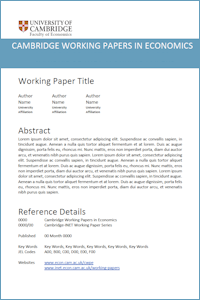
Liu, K.
Dollar Hegemony and China's Economy
CWPE1410
Abstract: This paper models the US dollar as a global currency and focuses on the effects of US money supply shock upon China's economy. The special roles of US dollar as a global currency and the special institutional arrangements of China are investigated. Given a positive US money supply shock, both the inflation and real GDP of China will be below their steady state levels in the medium term; while for the US there is no inflation pressure. Welfare calculation shows that a positive 10% US money supply shock will result in a positive 1.25% welfare gain for China, a positive 0.06% welfare gain for US, but a 0.21% welfare loss for the rest of the world. Given that the US dollar's hegemony is not weakened, the regime with liberalized capital accounts and an exchange rate peg to the US dollar for China is best for the Chinese households under the US money supply shock. However, when the US dollar is no longer the global reserve currency but instead a supranational reserve currency replaces it, then for China this regime is the worst kind of reform, no matter whether or not the dollar standard in international trade is maintained.
Keywords: US dollar, global currency, capital control, exchange rate, business cycle
JEL Codes: E32 E42 E51 F31 F41 F44
Author links:
PDF: https://www.econ.cam.ac.uk/research-files/repec/cam/pdf/cwpe1410.pdf 
Open Access Link: https://doi.org/10.17863/CAM.4952
